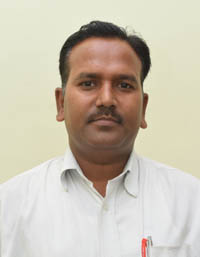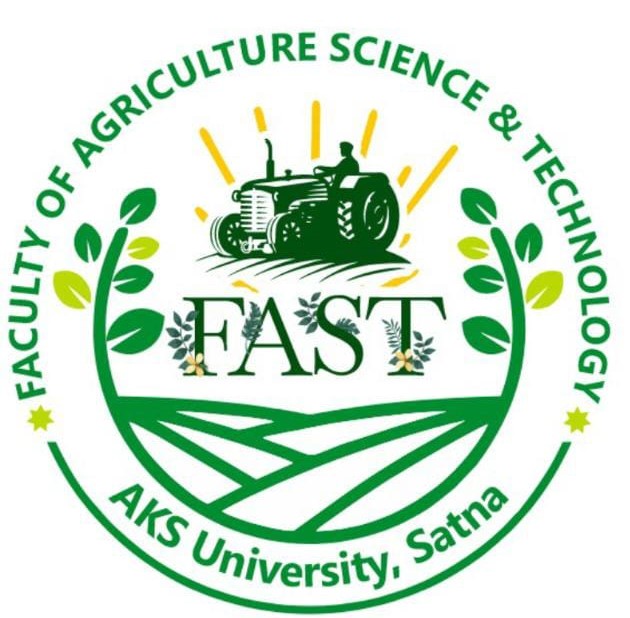Department of Agronomy
About the Department
Vision
Mission
HOD's Desk
Graduate Attributes (GA)
About the Department
Overview of the Department
The Department of Agronomy at AKS University, Satna, this department has played a crucial role in advancing the field of agronomy through its dedicated focus on teaching, research, and extension activities. it serves as a vital link connecting scientific innovations with practical field-level applications to enhance agricultural productivity and promote sustainable development.
Our department offers comprehensive academic programs that equip students with the theoretical foundations and practical expertise required for successful careers. Through rigorous coursework and hands-on training, students gain insights into crop production systems, soil management techniques, weed control strategies, and sustainable farming practices.
Beyond the classroom, our department takes pride in leading initiatives such as Organic Farming, Natural farming and awareness campaigns on organic farming, sustainable practices, and environmental conservation. Our dedicated faculty members continually strive to provide quality education and ensure that the latest agricultural advancements reach both students and farmers.
Our department offers comprehensive academic programs that equip students with the theoretical foundations and practical expertise required for successful careers. Through rigorous coursework and hands-on training, students gain insights into crop production systems, soil management techniques, weed control strategies, and sustainable farming practices.
Beyond the classroom, our department takes pride in leading initiatives such as Organic Farming, Natural farming and awareness campaigns on organic farming, sustainable practices, and environmental conservation. Our dedicated faculty members continually strive to provide quality education and ensure that the latest agricultural advancements reach both students and farmers.
Key Achievements
1. Experiments on sustainable agriculture, integrated nutrient management and integrated weed management were also conducted on the farm.
2. Experiments on use of herbicides for different field crops were conducted.
3. Sufficient research work has also been carried out at agronomy farm on the weed control. It proved that weed has direct influence on crop growth and yields and all crops suffer to greater extent from competition of weeds and therefore needs to be controlled at critical growth stages of different crops.
4. With the introduction of hybrid varieties of Jowar, Maize, and Bajra, experiments on optimum requirement of chemical fertilizer dose were also conducted.
5. Certain trails have also been conducted on crops like Paddy, Wheat, pearl millet, Millets to find out the optimum date of sowing / transplanting under Satna condition.
6. Focuses on disseminating technologies and opportunities for efficient and sustainable crop production to improve the quality of produce.
7. publishing research papers, producing books and articles, faculty awards, student success in national exams, and placement in government and private sectors.
2. Experiments on use of herbicides for different field crops were conducted.
3. Sufficient research work has also been carried out at agronomy farm on the weed control. It proved that weed has direct influence on crop growth and yields and all crops suffer to greater extent from competition of weeds and therefore needs to be controlled at critical growth stages of different crops.
4. With the introduction of hybrid varieties of Jowar, Maize, and Bajra, experiments on optimum requirement of chemical fertilizer dose were also conducted.
5. Certain trails have also been conducted on crops like Paddy, Wheat, pearl millet, Millets to find out the optimum date of sowing / transplanting under Satna condition.
6. Focuses on disseminating technologies and opportunities for efficient and sustainable crop production to improve the quality of produce.
7. publishing research papers, producing books and articles, faculty awards, student success in national exams, and placement in government and private sectors.
Vision
Vision
Enhance the knowledge about the innovative technology for increasing the crop production and boost up the Indian economy. Promoting the responsible, ethical use and management of air, water, soil, plant and animal resources including sustainability in agricultural practices are vision of department of agronomy.

Mission
Mission
1. To advance understanding of the biology of agronomical crops and their interactions with soil. The faculty focuses on all aspects of the production technology of various crops.
2. To provides experiential educational and research opportunities to prepare the next generation of scientists and global citizens to be competent in resolving the complex challenges of the 21st century and in providing a healthy and secure food supply while protecting our environment.
3. The department aims to strengthen the economy and quality of life for society by developing human resources, technologies, and products.
4. It is our aim to be a world leader in research, teaching, and extension involving plant health while serving the changing needs of society, the environment.
2. To provides experiential educational and research opportunities to prepare the next generation of scientists and global citizens to be competent in resolving the complex challenges of the 21st century and in providing a healthy and secure food supply while protecting our environment.
3. The department aims to strengthen the economy and quality of life for society by developing human resources, technologies, and products.
4. It is our aim to be a world leader in research, teaching, and extension involving plant health while serving the changing needs of society, the environment.
HOD's Desk
Dr. Dheerendra Prasad Chaturvedi
M.Sc.(Ag) Agronomy, Ph.D. in Agronomy
Head of the DepartmentDepartment of AgronomyAKS University, Satna (M.P.) India – 485001

Message
It gives me immense pleasure to welcome you to the Department of Agronomy, where we are dedicated to advancing agricultural science through quality education, innovative research, and impactful extension activities. As one of the core branches of agricultural sciences, agronomy plays a pivotal role in enhancing crop production, improving soil health, and promoting sustainable farming practices.
Our department is committed to nurturing students into skilled agronomists who can meet the challenges of modern agriculture and contribute to global food security. Through a blend of theoretical instruction, practical field training, and research exposure, we aim to build a strong foundation in crop science, soil management, and environmental stewardship.
We take pride in our experienced faculty, well-equipped laboratories, research farms, and collaborations with national and international institutions. Together, these resources create a vibrant learning environment that encourages innovation and problem-solving.
As the Head of the Department, I encourage students to be curious, proactive, and passionate about agronomy. I also invite academic and industry collaborations that support our mission to create a more sustainable and productive agricultural future.
Thank you for visiting our department, and I look forward to your continued support and engagement.
Our department is committed to nurturing students into skilled agronomists who can meet the challenges of modern agriculture and contribute to global food security. Through a blend of theoretical instruction, practical field training, and research exposure, we aim to build a strong foundation in crop science, soil management, and environmental stewardship.
We take pride in our experienced faculty, well-equipped laboratories, research farms, and collaborations with national and international institutions. Together, these resources create a vibrant learning environment that encourages innovation and problem-solving.
As the Head of the Department, I encourage students to be curious, proactive, and passionate about agronomy. I also invite academic and industry collaborations that support our mission to create a more sustainable and productive agricultural future.
Thank you for visiting our department, and I look forward to your continued support and engagement.
Graduate Attributes (GA)
Graduate Attributes (GA)
1. Strong Foundation in Agronomic Science Deep understanding of crop science, soil science, plant nutrition, and sustainable farming systems.
2. Research and Analytical Skills Ability to design, conduct, and interpret agronomic research using modern tools and scientific methods.
3. Problem-Solving Ability Capable of diagnosing and addressing real-world agricultural challenges with innovative and practical solutions.
4. Environmental and Sustainability Awareness Committed to sustainable agriculture practices that protect natural resources and promote biodiversity.
5. Technical Proficiency Skilled in the use of agricultural technologies, including GIS, remote sensing, precision farming, and lab techniques.
6. Communication and Extension Skills Able to communicate scientific information effectively to both technical and non-technical audiences, including farmers and policymakers.
7. Teamwork and Leadership Collaborates effectively in multidisciplinary teams and demonstrates leadership in agricultural settings.
8. Ethical and Social Responsibility Upholds ethical standards in research and practice while being sensitive to the socio-economic issues in agriculture.
9. Adaptability and Lifelong Learning Prepared for continuous learning in a dynamic agricultural landscape, including climate change and technological innovation.
10. Entrepreneurial Mindset Encouraged to explore agribusiness opportunities and contribute to the development of rural economies.
2. Research and Analytical Skills Ability to design, conduct, and interpret agronomic research using modern tools and scientific methods.
3. Problem-Solving Ability Capable of diagnosing and addressing real-world agricultural challenges with innovative and practical solutions.
4. Environmental and Sustainability Awareness Committed to sustainable agriculture practices that protect natural resources and promote biodiversity.
5. Technical Proficiency Skilled in the use of agricultural technologies, including GIS, remote sensing, precision farming, and lab techniques.
6. Communication and Extension Skills Able to communicate scientific information effectively to both technical and non-technical audiences, including farmers and policymakers.
7. Teamwork and Leadership Collaborates effectively in multidisciplinary teams and demonstrates leadership in agricultural settings.
8. Ethical and Social Responsibility Upholds ethical standards in research and practice while being sensitive to the socio-economic issues in agriculture.
9. Adaptability and Lifelong Learning Prepared for continuous learning in a dynamic agricultural landscape, including climate change and technological innovation.
10. Entrepreneurial Mindset Encouraged to explore agribusiness opportunities and contribute to the development of rural economies.

